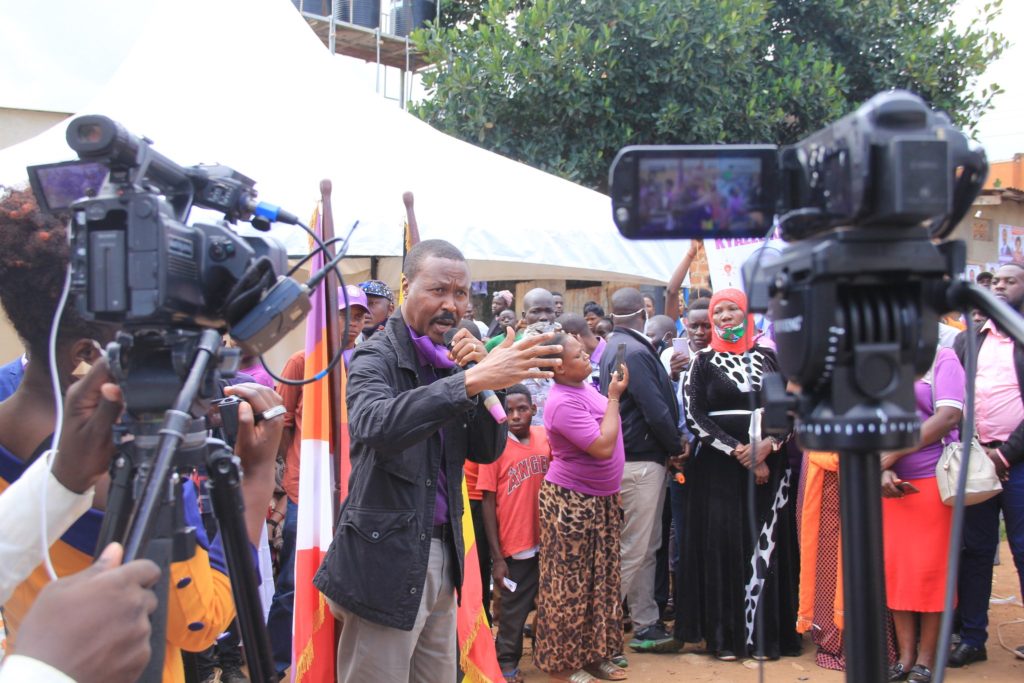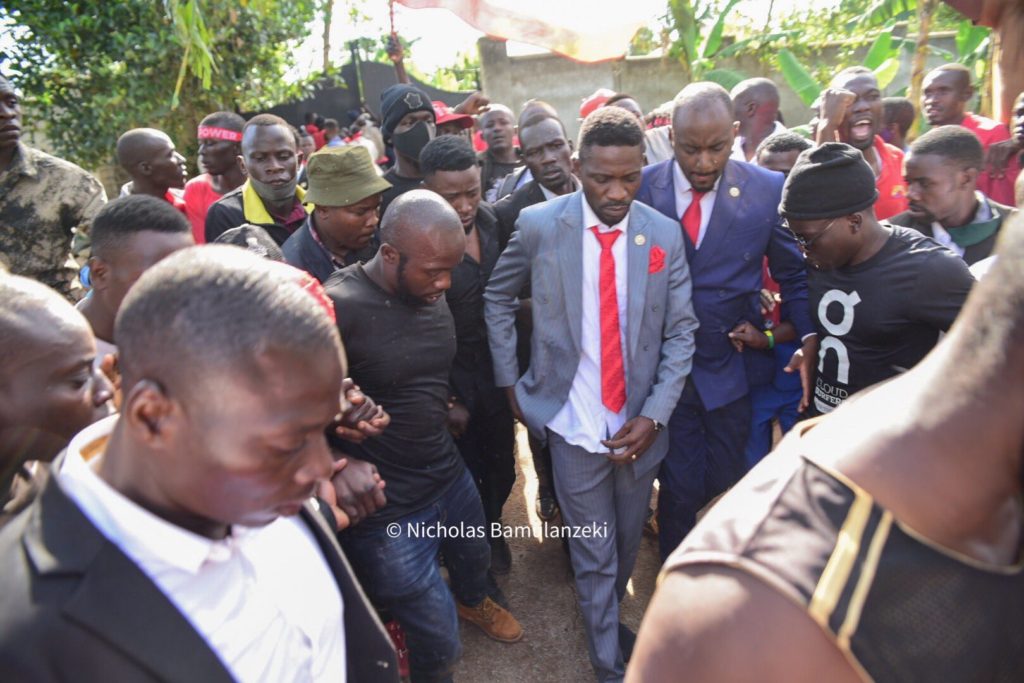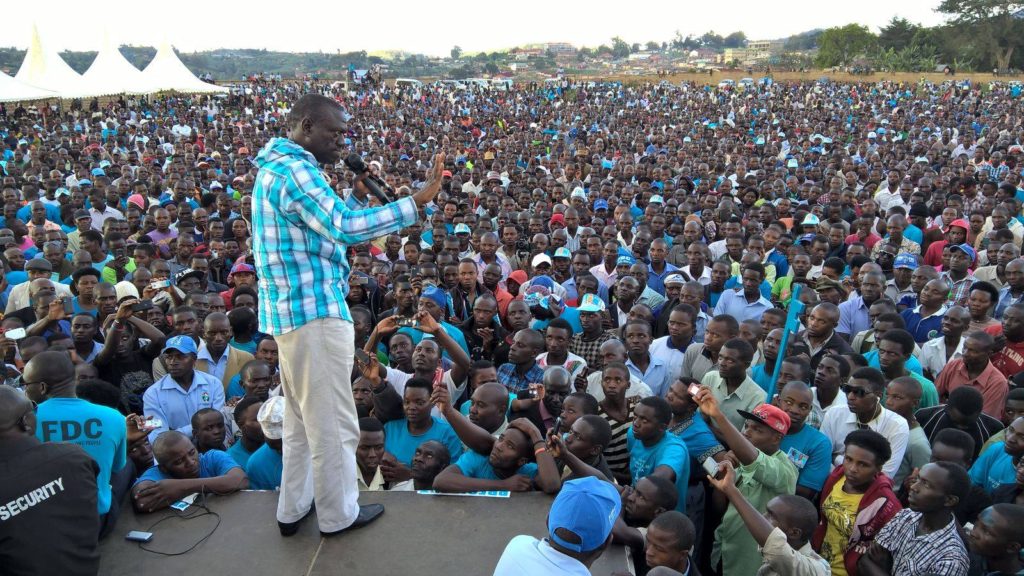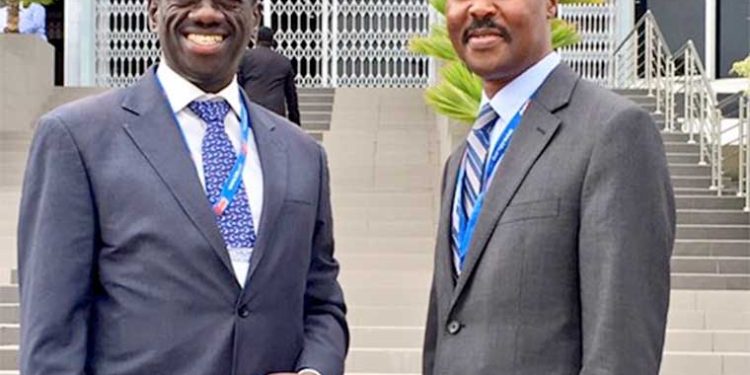By Robert Madoi
There is chalk and cheese; then there is Kizza Besigye and Mugisha Muntu. The differences between the two retired servicemen — one of whom will be on the ballot for next January’s presidential election — are hardly subtle. While Besigye needs little invitation to strike a combative tone, Muntu always has a kind of austere modesty about him. With both protagonists doubling down on the idea that their strikingly different styles are what can snap President Yoweri Museveni’s 34-year stay in power, next year’s poll will provide an unvarnished assessment of their approaches. A referendum of sorts.
After contesting every presidential election since the turn of the millennium, Besigye recently revealed that he won’t be having a fifth crack at the presidency. While revealing the key strut of his approach in August, Besigye threw up a grim question to a Forum for Democratic Change (FDC) party he helped found in December of 2004: whether or not to participate in, “another election to legitimise the junta.”
Four failed attempts have left the doyen of opposition politics stronger than ever in the conviction that elections in Uganda are a ritualistic coronation of an incumbent. Besigye, who proffered a so-called Plan B couched in civil disobedience, went to add: “Trust my judgement: This country will not be free by [Electoral Commission Chairman (Justice Simon Byabakama) going to Kololo [Independence Grounds] to announce that there is another leader other than Mr. Museveni. It’s our duty to make sure he leaves whether he wants or not.”
No beauty in the Wild West
Whereas Besigye will not be on the ballot, Muntu makes his grand entry in 2021. Clearly, the stark contrasts between the two politicians will not pass easily in the before and after. Both Besigye, 64, and Muntu, 62, belonged to the same political party the last time Uganda went to the polls in 2016. But then at the backend of September of 2018, Muntu announced that he was breaking ranks with the FDC to form his own political party. True to its name, the party, which has since come to be known as Alliance for National Transformation (ANT), intends to trigger transformation by re-establishing opposition politics on a new footing. The confrontationally hard-nosed mentality of the FDC has through witting and unwitting complicity been described as a Wild West.

When Muntu came through unopposed as ANT’s presidential flag bearer back in June, the tone of his acceptance speech departed with confrontation. He said: “We must depend on the strength of systems and institutions, and it is the path we intend to walk.” The 62-year-old presidential hopeful also spoke favourably about “engaging with other political groups” and “being open-minded” during the discussions.
On previous occasions, Besigye has stopped short of calling such discussions that precede general elections a bureaucratic talking shop. In the run-up to the 2016 poll, his unease with The Democratic Alliance (TDA) was almost tangible. It soon became locked in confrontation when Norbert Mao, president general of Uganda’s oldest party, the Democratic Party, revealed that Amama Mbabazi had emerged as the opposition’s preferred joint candidate. Rather than engage in rope pulling, Besigye chose to decry what he described as a conspiratorial vision of electoral processes in the country. He rallied Ugandans to join him in the push for electoral reforms only to be disappointed by what he calls “elites.” To date, he has taken a dim view of the subset. “[Elites] want [their] own comfort. The hottest part in hell is waiting for them,” he once said.
Before the 2016 poll, Besigye had asked Ugandans, “to say that we are not going to allow you to organise another fraudulent election in Uganda.” Muntu had warned that such a call to arms would end up being no more than populist rhetoric. The former army commander said thus: “When you are a leader never give a threat unless you are confident enough to see it through.” The point of departure was not novel. Besigye and Muntu have always been cleaved by glaring differences. They fought a number of bitter but hardly marginal contests by ballot while both were in FDC. Muntu lost all contests, including one for the party’s presidential flag bearer in 2015.
Going after ‘Besigyism’
During that contest, Muntu took the gloves off and went after Besigye like never before. The terms ‘Besigyism'(extremism) and ‘Besigyist’ (hardliner) were added to Uganda’s political lexicon. Intended as pejoratives, they barely covered Besigye in glory. “If you take the path of civil disobedience,” Muntu said of Besigyism during a televised debate, “it will easily be dispersed. As a leader, I don’t like posturing. I never want to give threats which cannot be carried through.”
It’s a notoriously difficult task to tell whether attitudes have grown significantly more favourable to Besigyism. The nomination process of candidates in the 2021 presidential race underscored which approach Uganda’s security apparatus is relentless in targeting. While Muntu in his well-pressed suit managed to retain a sense of chivalry towards his wife en-route to being nominated, FDC’s flag bearer, Patrick Amuriat Oboi, sported a disheveled look. After defying police orders in a manner Besigye would unabashedly endorse, Oboi was shoved into a saloon car and left at the nomination centre shoeless. He has since said that “an election by itself cannot bring the desired result.”
Oboi was not the only one to be left bedraggled during the second and final nomination day on November 3. National Unity Platform party leader, Robert Kyagulanyi was pepper-sprayed and promptly driven home after handing in his nomination papers. The 38-year-old looks primed to be a rock star on the campaign trail thanks in no small part to a combative approach. Kyagulanyi party’s meteoric rise received a shot in the arm when a string of legislators from Democratic Party pledged allegiance to him.

Although Muntu has taken with him a number of former FDC stalwarts to ANT, not least Alice Alaso and Winnie Kiiza, Besigyists have been quick to say the turbulent surface conceals a steadfastness to dislodge what they call a “military junta.” Erias Lukwago, whose recent crossover from Democratic Party to FDC gave Uganda’s leading opposition party a new lease of life, best captures the resolve and determination. After receiving the FDC card, the Kampala Lord Mayor revealed that, “I further reassert myself to the philosophy of defiance to be able to subdue the gun culture.”
Fanning the flames
For Besigye, whom defiance has long had an equivocal status, any chance to fan flames is warmly welcomed. He used Lukwago’s unveiling to ask hardliners to up their game correspondingly. While some believe the depth and fury of his ‘walk to work’ protest movement cannot be replicated, the four-time presidential contestant reckons there will be a terrible reckoning if a swelling tide of discontent does not erupt. “Why must Ugandans condition their minds according to [the Electoral Commission’s] plans? Why should we wait for 2021?” he rhetorically asked the throng that witnessed Lukwago’s unveiling. “This country can be liberated before that. I would like FDC to remain in the vanguard of that liberation.”
If this sounds eerily similar, it is because the lead up to the 2016 poll followed a similar pattern. There was no public uprising though. Besigye eventually polled 35.61% to president Museveni’s 60.62% in an election with a turnout of 67.61%. Going into the poll, Muntu had warned that Besigye’s doublespeak would wind up being self-defeating. “My view is that if you use both simultaneously it will weaken us as an opposition because you send different signals to the population,” he said, going on to add, “You will never go through an election and win nor will you succeed through civil disobedience.”
Besigye has cast his lot with civil disobedience ahead of the 2021 poll. He says, far from what people think, “fighting a dictator is [not] a luxury.” The FDC strongman is nevertheless cocksure “that the end of this struggle is very near.” Observers who have managed to hazard a guess say it’s not just possible but perhaps inevitable that Besigye is hoping a groundswell of opposition will develop in the wake of a lopsided Museveni win. Then it will be 1980 all over again. Alleged widespread fraud that saw Uganda People’s Congress win 75 of the 126 parliamentary seats in an election with a voter turnout of nearly 86 per cent forced Museveni to the bush.
“I represent a bush constituency,” Museveni said while unveiling Alphonse Owiny-Dollo as Chief Justice. “When we came from the bush we linked up with the population…our issues are very clear: We want development and transformation.”
‘People are the new bush’
In drawing parallels with the guerrilla war that ultimately brought Museveni to power, Besigye has often gone to punishing lengths to show how civil disobedience has dispensed with certain beliefs. While unpacking the ‘walk to work’ protest movement to its most elemental dimensions, the FDC strongman once said the bush has metamorphosed into people. Yet only with great difficulty has Besigye been able to get people to refuse to comply with certain laws considered unjust. This has often left him exasperated. Only recently, he revealed his shock at the failure of the spate of self-immolations to trigger an uprising.

“I’m deeply pained that boda-bodas just looked on,” Besigye said of one act of self-immolation in which a commercial motorcycle rider protested against having his bike withheld. “Boda-bodas can take over government within one week alone. What lacks is the information of what to do.”
If Besigye is hedging his bet by setting more store on civil disobedience, Muntu has made no secret of being desirous of “value-driven politics.” He has indicated a burning desire to “create an environment where there can be open, transparent, and democratic processes.” After being nominated to run for president, the 62-year-old said that “with the passage of time, it will become self-evident that a new era is starting.” His “value-driven institution” will, Muntu added, “walk people on a journey of recovery of their dignity.”
That’s not to say that Muntu is all too happy to flaunt his unreadiness to acknowledge the existence of upheavals that always compel foreign observer missions to pepper their post-election verdicts with a veneer of criticism. The ANT supremo is mindful that Uganda’s electoral system is tangled up in inadequacies. His cool is no less apparent in the criticism. “We’ve never seen any election that is conducted in the manner where all those who are involved trust in the outcome of it,” he acknowledged after being nominated. “[If the Electoral Commission] conduct[s] a free, fair, and transparent process, [it] will have made history because [it] will conduct a process that we trust.”
Trust in the Electoral Commission though is a fragile commodity in Besigye’s book. Thus the Plan B in which he trusts will yield tangible dividends.
“Watching how this thing can come to an end is my full-time job. I’m sure it can be done even when there is no nomination,” Besigye vowed. Time alone can tell who between the two retired army officers read the situation better.







